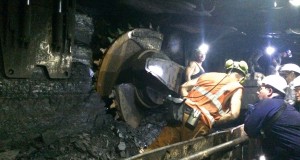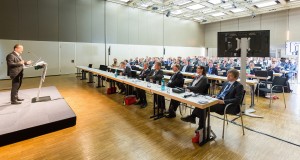The 9th Saxon Raw Materials Day took place on 29th April 2015 in the Taschenbergpalais, Dresden, and focussed on „The future of coal mining in Germany“. Presentations and discussions focussed on the general legal and administrative conditions, the geological and technological challenges and issues of acceptance in the current and future German coal mining industry. The conference made the need for action in these sectors extremely clear and addressed political, administrative and social proposals and expectations, in order to guarantee local raw materials production in the future that is efficient and run in accordance with internationally renowned environmental and social standards. The Saxon Raw Materials Day is organised by GKZ Freiberg e. V. (The Freiberg Geocompetence Centre) and is sponsored by the Saxon State Ministry for Economic Affairs, Labour and Public Transport.
In his opening statement, State Secretary Dr. Hartmut Mangold from the Saxon Ministry for Economic Affairs, emphasised the important role of local raw materials. „Raw materials are the foundation of any industrial value creation. In Saxony, we are concentrating on using our own secondary and primary raw material deposits, thus guaranteeing a sustainable supply of raw materials – that is our strategy for raw materials in Saxony. Saxony is not a mining entrepreneur. The state government will above all support investors in this industry and encourage cooperation between researchers, medium-sized companies and international stakeholders.“ As examples of the Saxon raw materials policy, Dr. Mangold referred to the positive progress of the major ROHSA (Raw materials in Saxony) project, initiated by GKZ, and to the increasing number of research and exploratory projects on local raw materials.
Dr. Steinbach, from the Federal Institute for Geosciences and Raw Materials (GBR), Hanover, stressed that securing the supply of raw materials both locally and internationally is of great significance for industrial policies. Processing them is complicated and must be prioritised, from local extraction of raw materials through to the smooth running of global markets right up to issues of raw materials efficiency.
Presentations on scientific, planning and legislative conditions surrounding the extraction of local raw materials substantiated the high level of technical and scientific expertise in Germany, and the high standards of environmental protection and safety in the German coal mining industry. They also analysed the considerable need for action in harmonising raw-materials planning between regions, in avoiding excessive regulation and in guaranteeing wide social acceptance of the coal mining industry in Germany. (SMWA Sachsen/Si)

